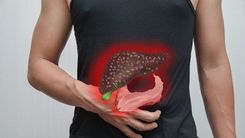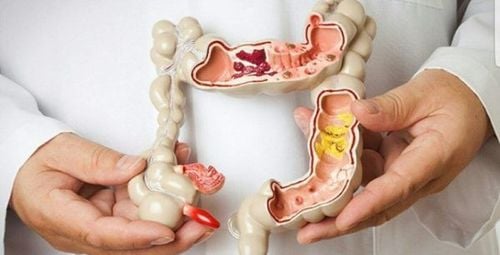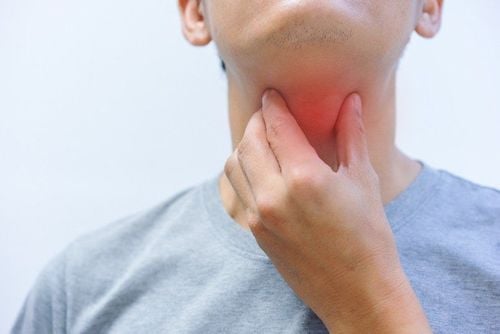The sensation of a lump in the throat, difficulty breathing, or swallowing are common symptoms that can significantly affect daily life and health. These symptoms may indicate esophageal cancer or other health issues.
1. What Does the Sensation of Throat Obstruction Feel Like?
Some people experience a sudden sensation of throat obstruction or difficulty swallowing. Others may feel as though a lump is stuck in their throat, which may cause pain, itching, tightness, burning, or prickling sensations. It may also feel dry, tense, or painful when eating, drinking, or swallowing saliva. Other individuals report sensations of a foreign object, such as a hair, bone, or pill, stuck in their throat.
This subjective sensation might be due to functional disorders without any actual physical abnormalities. However, in some cases, it could be a sign of serious conditions. In reality, most of these sensations are caused by swelling or inflammation that narrows the throat, rather than the presence of an actual lump.
The symptoms may temporarily improve after eating or drinking but can worsen over time. Patients should monitor their symptoms closely and consult a doctor when necessary. Potential causes include local issues, conditions in adjacent areas, systemic diseases, or psychological factors like anxiety and throat-related sensory disorders. If the sensation is intermittent, primarily noticeable when swallowing saliva, and alleviates after eating, it is usually not a cause for concern.
2. Throat Obstruction is A Warning Sign of Esophageal Cancer
Frequent sensations of throat obstruction, combined with the detection of a mass in the esophageal or throat lining, may signal esophageal cancer. As a tumor grows, it can compress the throat, narrowing it and causing symptoms such as difficulty breathing, swallowing, or a sensation of a lump. In some cases, the tumor may even be palpable externally.
Initially, esophageal cancer patients often experience difficulty swallowing without pain. As the condition progresses, painful swallowing occurs. The difficulty starts with solid foods but can advance to liquids, and even swallowing saliva may become painful.
Other symptoms include drooling, bad breath, frequent belching, and choking while eating or drinking. Significant weight loss often occurs due to dehydration and reduced food intake. Patients may also experience back pain, pain behind the breastbone or between the shoulder blades, throat irritation, prolonged coughing, or even coughing up blood. Additional signs include nausea, a feeling of tightness in the throat, hoarseness, and phlegm.
Based on symptoms alone, it is difficult to diagnose the disease. Therefore, when there is an obstruction sensation, it is crucial to seek medical evaluation for proper diagnosis and timely intervention.

3. Other Causes of Throat Obstruction
Throat obstruction and difficulty breathing often raise concerns about the risk of cancer. However, in most cases, the cause of this symptom is mild inflammation in the throat and back of the mouth, sometimes combined with symptoms of anxiety, excessive worry,...
Some causes of throat obstruction sensation and difficulty swallowing in the throat include:
- Chronic pharyngitis: This is a condition in which the throat mucosa is repeatedly swollen and inflamed, causing the patient to have a dry, hot throat, itchy, sore throat, and the urge to spit. The swollen throat causes difficulty swallowing. When chronic pharyngitis becomes more severe, it can cause throat abscesses, sinusitis, tonsillitis, etc.;
- Tonsillitis: Tonsils are lymphatic tissue located in the throat, which can become inflamed due to infection, parasites, fungi, etc. When the tonsils are swollen and compressed, it will cause the throat to become obstructed, causing a feeling of choking, difficulty swallowing, sore throat, high fever, etc.;
- Sinusitis: Causes patients to have difficulty breathing, obstruction in the throat, stuffy nose, headache, and pain in the facial bone area,... If not treated early and thoroughly, the disease can cause dangerous complications such as impaired vision, sleep apnea,...;
- Gastroesophageal reflux: A disease caused by gastric juice reflux into the esophagus, causing symptoms of heartburn, acid reflux, nausea, stuck in the throat, etc. If not treated timely, gastric reflux can progress severely, leading to complications including esophageal narrowing or even esophageal cancer;
- Pneumonia, and bronchitis: These are diseases that cause inflammation and narrowing of the airways, causing difficulty breathing and swallowing;
- Hypopharyngeal cancer: Symptoms include throat discomfort, difficulty breathing, painful swallowing, swollen lymph nodes in the neck,...;
- Asthma: Is a disease that causes inflammation and narrowing of the airways in the lungs, making the respiratory tract hypersensitive and obstructed. Patients have symptoms of dyspnea, coughing, and tightness in the chest and throat;
- Chest pain: When the heart muscle does not receive enough oxygen-rich blood, the patient will experience chest pain. This leads to angina causing symptoms of chest pain radiating to the throat, accompanied by nausea, fatigue, and pain in the jaw, shoulders, or back;
- Thyroid disease: Diseases such as goiter, and thyroid cancer can cause uncomfortable symptoms in the throat such as difficulty swallowing, difficulty breathing, obstruction in the neck,...
4. What should I do when I feel a lump in my throat?
Symptoms of throat obstruction and difficulty swallowing are quite common. To determine the exact cause, it is important to consult an ENT (ear, nose, and throat) specialist as soon as possible. Patients should provide detailed information about their symptoms and any underlying health conditions to ensure a timely and accurate diagnosis.
If the symptom of choking in the throat is accompanied by difficulty breathing and warning signs of esophageal cancer, the patient should see a doctor immediately. This includes frequent vomiting, rapid weight loss, painful swallowing, pain in the neck or throat, palpable mass in the throat or around the neck, fever, swollen lymph nodes,...
To alleviate symptoms of throat obstruction and difficulty swallowing, you can try the following remedies: Suck on honeyed lemon slices; suck on fresh garlic for about 5 - 10 minutes then chew and swallow slowly; drink warm water to soothe the throat; drink warm tea every morning to cleanse the throat and promote alertness, gargle with salt water to clean and disinfect the throat.

5. Measures to prevent esophageal cancer
Since the sensation of choking in the throat and difficulty swallowing can be a symptom of esophageal cancer, taking preventive measures is important to avoid encountering these unpleasant symptoms. Here are some strategies to help prevent esophageal cancer:
- Do not smoke, as cigarette smoke contains numerous toxic substances that can stimulate cell abnormalities, increasing the risk of esophageal cancer.
- Limit alcohol consumption, as prolonged alcohol use damages the lining of the esophagus and stomach.
- Follow a scientific diet that includes plenty of vegetables and fruits, and divide meals throughout the day to reduce cancer risks. Prioritize foods rich in fiber, protein, green vegetables, whole grains, and green tea. At the same time, limit consumption of processed foods, fried foods high in oil, and spicy dishes.
- Maintain a healthy body weight, establish a balanced rest and activity schedule, and manage stress to promote overall health.
- Regularly undergo health check-ups and cancer screenings to detect and prevent diseases early, especially for individuals with a history of prolonged esophagitis or neck cancer.
If you experience the sensation of choking in the throat, it is not possible to immediately determine the exact illness or its severity. Doctors must evaluate other symptoms and perform examinations and tests to make an accurate diagnosis. However, since this is a warning sign of potential esophageal cancer, patients should not ignore it and are advised to seek medical attention early.
Please dial HOTLINE for more information or register for an appointment HERE. Download MyVinmec app to make appointments faster and to manage your bookings easily.













